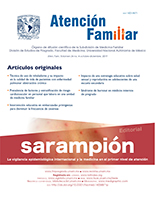Educational Intervention for Women during their First Pregnancy to Reduce the Frequency of Caesarean Sections
Main Article Content
Abstract
Objective: to assess the impact of an educational strategy on pregnant women during their first pregnancy to decrease the frequency of C-sections. Methods: non-randomized clinical trial carried out from November 2017 to April 2018, at the Regional General Hospital no.1 Vicente Guerrero of the Mexican Institute of Social Security (imss) in Acapulco, Guerrero, Mexico, in 172 pregnant women from 18 to 35 years with a low-risk pregnancy. Two groups of 86 participants each were formed. The intervention group received educational information about labor and complications associated with unjustified caesarean sections. Simple frequency and bivariate analysis were performed. Percentages and relative risk were obtained, as well as confidence intervals and χ2. Results: the global hospital incidence of C-sections was 32%, for the control group was 36% and for the intervention group was 29%. Patients over the age of 25 were at increased risk of having a C-section at the termination of pregnancy (rr: 1,803). Conclusions: Implementing a standardized prenatal education program could have a positive impact on reducing the incidence of C-sections.
